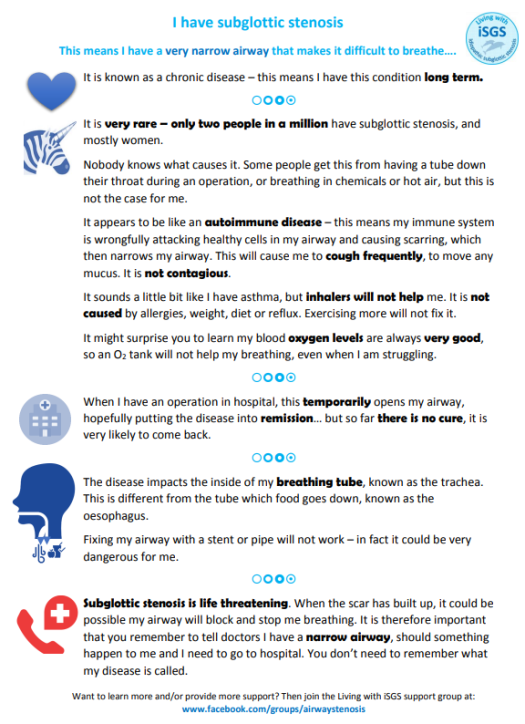
Catherine Anderson lives with a rare disease, idiopathic subglottic stenosis. This is the development of scar tissue in the area just below her vocal cords, closing her airway with no known cause. This results in shortness of breath and fatigue, with surgery the primary treatment. In the 20 years since her diagnosis, she has had more than 30 general anesthetics and procedures to re-open her airway. The disease mainly impacts women (98%), affecting an estimated 2.5 women in every million.
In 2009, Catherine set up what has now become the world’s largest support group for this condition – Living With Idiopathic Subglottic Stenosis. She talks at conferences around the world, has written numerous articles and papers for international peer reviewed laryngology journals and is involved in helping doctors with medical studies aimed at helping patients with this disease. Read more about Catherine’s story here.
Click here to join the community: www.facebook.com/groups/airwaystenosis/

Purchase t-shirts, note books, drink bottles and so much more at the Airway Stenosis Research Store – 100% of all profits go towards airway stenosis research.
(Note: currently only delivers within the UK, other countries coming soon!)
There are also many resources to help you here:
The Rough Guide for Beginners – a guide book for airway stenosis patients offering advice and information about the various treatments available as well as tips on living with this disease

Preparing for an emergency – a one-page flyer that accompanies the guide to aid patients in preparing themselves and their supporters (e.g. family, friends) in the case of an emergency.

Explaining subglottic stenosis to friends and family can be very challenging. To make it easier, here is a short and simple one page document to help explain the disease, downloadable here.
Living with a Tracheostomy – help and advice for patients from patients, doctors and nurses with experience
Ask the Doc – Catherine was a panelist with four esteemed doctors from the USA – this was held in October 2021 answering many patients’ questions and educating on the latest research and treatment options for this disease
Conferences, meetings and webinars – Catherine frequently is invited to talk at events – here she shares recordings, notes and presentations from past events and details of upcoming sessions

************************
How can you help?
Recent research has found that women from lower socio-demographic backgrounds were extremely underrepresented with this disease, suggesting their symptoms are still not diagnosed correctly. Please download and print the following flyer and take it along with you to your next GP visit – you could help save lives!

